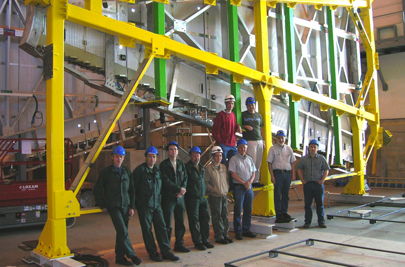Bensinger on Brandeis and the Higgs boson
Physicist talks about university's role in the CERN project
 Photo: courtesy of Brown University
Photo: courtesy of Brown UniversityBrandeis physicists in front of precision muon chambers
BrandeisNOW: How has Brandeis been involved over the past 18 years? What was Brandeis' contribution to this finding?
James Bensinger: We became involved in 1994 joining the ATLAS experiment with many others, including a consortium of New England researchers from Boston University, Tufts, Harvard and MIT. Brandeis joined to work on the design, construction, commissioning the outer layer of the detectors that identifies and measures a particular sub-atomic particle called muons. Some of the measurement chambers were constructed by this consortium at Harvard, then shipped to CERN where we installed them in the experiment. One of the unique Brandeis contributions was we designed what’s referred to as the alignment system; once you put these chambers in place it tells you their precise location. This was something that was a significant contribution and done solely by Brandeis. The experiment itself started running about two years ago. We’ve had two years of data collection. Decays into muons is one of the signatures of the Higgs boson.
Why should the average person, not only the science community, be interested in this research?
I personally think it has to do with the nature of human beings. We tend to be explorers, and we push the limits of our environment - fundamental knowledge is one of the limits of our environment; how much we understand about that nature of the universe. I think there's a lot of interest - not by everybody - but a substantial number of people are interested in basic science, the fundamental building block of the universe and what are the rules. There are a lot of people that really do care about scientific inquiry.
How did it become nicknamed "the God particle"?
Because it's the origin of mass. So that God created matter. I, by the way, really hate that name. I think it's so misleading.
Do you feel this new discovery may anger religious groups?
I think the name may anger religious groups. I can't believe that they care about the discovery itself.
What will happen next in terms of research?
As I said before, it’s not yet established that this is the Higgs boson. Its properties must still be studied in detail. There are things in the universe that we know about but aren't explained by the standard model. The hope is when we're done, we'll understand all that but we're not there yet. It’s sort of like peeling an onion. Every time you look into something there's another layer of structure. Over a hundred years ago, people knew there were atoms but they didn't know much beyond that. Then they discovered that the atoms had a nucleus and electrons and a structure going around them. Then they looked at the nucleus and they saw that it wasn't just a solid chunk, but it had protons and neutrons and really understood how they went together. Then you look at a proton or a neutron individually and you understand more.
So, like I say, it's like peeling an onion. There's another layer of structure down below it. When you get there, you study it until you understand it, and then see if you can go beyond it.
Categories: Research, Science and Technology





